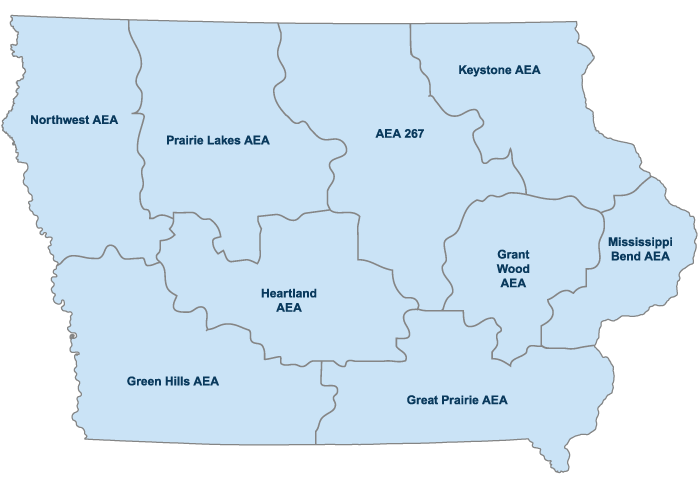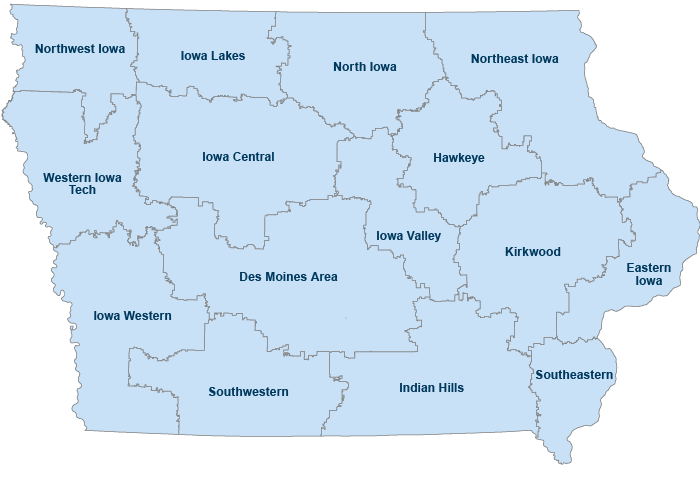On this page...
Iowa's public education system includes:
- Local school districts serving students in pre-kindergarten through 12th grade
- Area Education Agencies (AEAs) that provide support and assistance to the districts in a given region
- Community colleges that provide a wide range of coursework to students of all ages
- Four-year colleges and universities
The Iowa Department of Education and State Board of Education are responsible for the local schools, AEAs, and community colleges, while the Board of Regents, State of Iowa is responsible for the public four-year colleges.
Back to topLocal School Districts
Each local school district in Iowa must offer a complete education in all grades from kindergarten through 12th grade. All state residents are entitled to free public education up to age 21 and state law requires that all youngsters between the ages of 6-16 attend school either in their assigned "resident" district, through open enrollment to another district, or through private instruction (home schooling).
Quick facts about Iowa public schools*
- Districts: 327
- School Buildings: 1,326
- Students: 486,476
- Graduation Rate: 87.4% (class of 2022)
- Teachers: 38,092
* Data from The Annual Condition of Education Report: 2023
A "Local Control" State
While local districts are governed by state and federal laws that set broad parameters regarding coursework requirements, assessments, and teacher qualifications, each has its own locally elected board of directors that sets specific policy, defines academic requirements, and approves the local budget.
Accreditation
Districts are accredited through a differentiated accountability (DA) model. All districts and accredited nonpublic schools submit information to the state Department of Education to ensure the district is meeting state and federal requirements. Based on this information, districts may receive additional support as needed to meet requirements and/or to engage in continuous school improvement.
Curriculum Requirements in Iowa Schools
Iowa has established state content standards for curriculum, and each district is required to develop their own content standards that incorporate the state standards. In 2008, Iowa mandated the Iowa Core for all Iowa schools.
All districts are required to "offer and teach" certain types and numbers of courses, although each district administration selects its own local curriculum, textbooks, and other classroom materials. The "offer and teach" requirements are outlined in Iowa Administrative Code 281-12.
Generally, elementary grades 1-6 must teach language arts, social studies, math, science, health, physical education, traffic safety, music, and visual arts.
Junior high grades 7-8 must teach language arts, social studies, math, science, health, human growth and development, physical education, music, visual art, family and consumer education, career education, and technology education.
High school grades 9-12 must offer at a minimum six units of language arts, five units of social studies, six units of math, five units of science, one unit of health, one unit of physical education, three units of fine arts, four units of foreign language, and 12 units of vocational education.
In addition, the Iowa Core provides local school districts a guide to delivering instructional content that is challenging and meaningful to students. The Iowa Core identifies the essential concepts and skill sets for literacy, mathematics, science, and social studies, as well as 21st century learning skills (civic literacy, financial literacy, technology literacy, health literacy, and employability) that must be embedded throughout the local curriculum.
Teacher Qualifications
All classroom teachers must be properly licensed and certified in their subject area. Licensure requirements are set by the Iowa Board of Educational Examiners.
Area Education Agencies (AEAs)

Iowa has nine area education agencies or AEAs. AEAs are regional service agencies that provide school improvement services for students, families, teachers, administrators, and their communities. Each AEA is governed by a locally elected board of directors of between five and nine members, responsible for ensuring the AEA operates in the best interests of the students in accordance with state law.
The AEAs work as educational partners with public and accredited private schools. Agency staff members, school staff, and families work together to help all children reach their highest potential.
As intermediate agencies, AEAs offer the kinds of services that can be most efficiently and economically provided on a regional or cooperative basis among school districts. The Iowa system is widely regarded as one of the foremost regional service systems in the country.
AEA programs and services fall under nine state standards on which AEAs are accredited. Specific programs are outlined in each agency's Comprehensive Improvement Plan.
- School-Community Planning
- Professional Development
- Curriculum, Instruction and Assessment
- Diverse Learning Needs
- Multicultural, Gender-Fair
- Media
- School Technology
- Leadership
- Management
Visit the Iowa AEA website for more information.
AEA Websites
Central Rivers AEA
Grant Wood AEA
Great Prairie AEA
Green Hills AEA
Heartland AEA
Keystone AEA
Mississippi Bend AEA
Northwest AEA
Prairie Lakes AEA
Community Colleges

Iowa has a statewide system of 15 community colleges. These public, postsecondary, two-year institutions are organized as comprehensive community colleges. Each college serves a multi-county merged area that may vary in size from four to twelve counties; all of Iowa's 99 counties are included in one of these merged areas.
Community colleges are governed by locally elected boards of directors that consist of from five to nine members who are elected for terms of three years. Each community college offers a comprehensive educational program. All Iowans of postsecondary school age are eligible to attend any of the community colleges. Community colleges also offer special programs for students who attend local secondary schools.
A Wide-range of Services
Community colleges have an "open-door" admission policy that guarantees Iowans an opportunity for educational assistance and career development regardless of previous educational attainment. To implement this policy, community colleges offer: assistance in developing skills necessary for success in preparatory career and college parallel programs; supplementary services to disabled and disadvantaged students; and a variety of other support services designed to help students succeed.
Each community college offers a comprehensive educational program in three major areas of instruction:
- Adult education, including adult basic education programs for adults who have less than an eighth grade education; high school completion programs leading to adult high school diplomas and high school equivalency diploma; supplementary career programs of vocational and technical education; and continuing education programs.
- Preparatory career programs of vocational and technical education, to provide preparation for immediate employment in a wide variety of careers. Those training programs ordinarily require full-time instruction of four weeks to two years.
- College parallel coursework, which provides arts and sciences courses that may be transferred to other colleges and universities as the equivalent of the first two years of a four-year baccalaureate program.
Community colleges also offer unique educational programs and opportunities such as programs for incarcerated individuals in correctional facilities; evaluation and assessment centers; developmental education programs and services for underprepared students; special programs for the disabled, including sheltered workshops; customized training programs for business and industry; incubation centers to assist the development of small businesses; and the administration of service delivery areas for the Federal Job Training Partnership Act (JTPA).
The Community College Advisory Committee, formally known as the Community College Council, is a subcommittee of the Iowa State Board of Education. A driving charge of the Advisory Committee is to elevate community college issues for the Iowa State Board of Education so that board members might better oversee Iowa’s community colleges, advise the Department and inform statewide practices on issues related to the community colleges.
Back to top